You are currently browsing the category archive for the ‘Policies’ category.
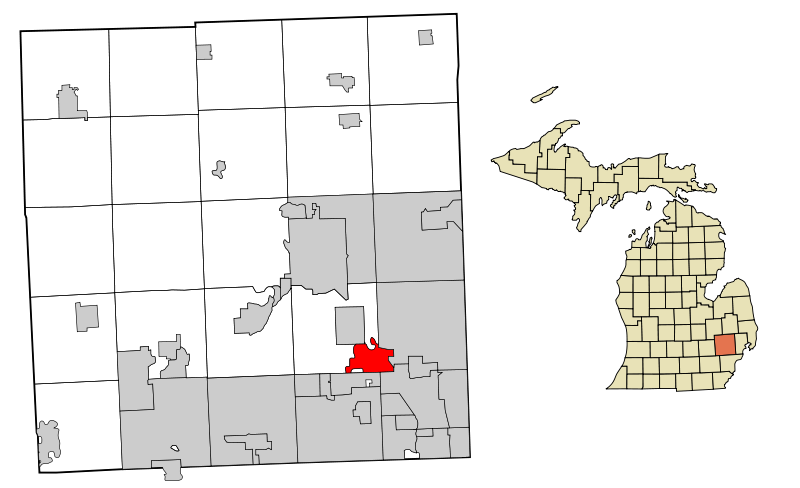 On July 11, 2011, Birmingham’s City Commission passed a Complete Streets resolution in support of multi-modal transportation planning to improve travel choices in the city. The resolution directs city staff to develop a set of proposed policies and procedures to implement Complete Streets practices. The City Commission voted unanimously to support the resolution and recognizes that while the city has long prioritized walkability, additional work remains to serve all user groups. This resolution comes after several discussions at the Planning Board about the benefits of Complete Streets and approaches to implementation. The city will move forward with identifying the most effective way to implement Complete Streets practices in its road planning process and hopes to work with other communities throughout Michigan to ensure that the city is employing best practices. By passing the Complete Streets resolution, Birmingham renews its commitment to promoting safe and convenient mobility options and improving the quality of life for all its residents.
On July 11, 2011, Birmingham’s City Commission passed a Complete Streets resolution in support of multi-modal transportation planning to improve travel choices in the city. The resolution directs city staff to develop a set of proposed policies and procedures to implement Complete Streets practices. The City Commission voted unanimously to support the resolution and recognizes that while the city has long prioritized walkability, additional work remains to serve all user groups. This resolution comes after several discussions at the Planning Board about the benefits of Complete Streets and approaches to implementation. The city will move forward with identifying the most effective way to implement Complete Streets practices in its road planning process and hopes to work with other communities throughout Michigan to ensure that the city is employing best practices. By passing the Complete Streets resolution, Birmingham renews its commitment to promoting safe and convenient mobility options and improving the quality of life for all its residents.
Download Birmingham’s Complete Streets resolution
Birmingham Patch coverage
 Taking a major step toward ensuring its streets, sidewalks and pathways are as safe, welcoming and functional as possible for all types of users, the City of Williamston has passed a Complete Streets ordinance, becoming the 7th Michigan community to do so. Adopted unanimously by the City Council at its June 12 meeting, the ordinance calls for a number of next steps, including that the City develop a Comprehensive Non-Motorized Transportation Plan to be incorporated into the City’s Master Plan when it is revised in 2012.
Taking a major step toward ensuring its streets, sidewalks and pathways are as safe, welcoming and functional as possible for all types of users, the City of Williamston has passed a Complete Streets ordinance, becoming the 7th Michigan community to do so. Adopted unanimously by the City Council at its June 12 meeting, the ordinance calls for a number of next steps, including that the City develop a Comprehensive Non-Motorized Transportation Plan to be incorporated into the City’s Master Plan when it is revised in 2012.
“This Complete Streets ordinance is the first step toward creating an even better experience for all those who travel in or through Williamston, whether they do so on foot or bike, or in a wheelchair, car or some other mode of transportation,” said Michael Gradis, Associate Planner for McKenna Associates and staff planner for the City of Williamston. “The positive effects of this ordinance will be seen very soon and yet last for generations.”
Among other things, the Complete Streets ordinance will help create better links between destinations within the City, including Williamston Schools, the commercial downtown and McCormick Park, Williamston Industrial Park, and newly constructed neighborhoods. The Non-Motorized Transportation Plan will also propose connections to surrounding communities.
With input from Williamston’s Department of Public Works and Police Department, Gradis and McKenna Principal Planner Greg Milliken, AICP, approached City Council about the merits of Complete Streets and drafted the ordinance that was eventually adopted.
The City has discussed a number of initiatives in conjunction with recent downtown streetscape and park improvements—all focused around the idea of “placemaking,” a term used to describe the process of creating spaces that are pleasurable, interesting and useful for new or existing users.
“By improving existing non-motorized infrastructure and expanding the non-motorized network throughout the City, we hope spaces once skipped over or not enjoyed will be reclaimed—particularly by new non-motorized users,” said Milliken.
Working for the City of Williamston, Gradis and Milliken have already begun drafting the Comprehensive Non-Motorized Transportation Plan and will soon conduct a series of brainstorming sessions with elected officials, other staff and the public.
By enacting the Complete Streets ordinance, Williamston has moved closer to its goals of encouraging healthy, active living; improving non-motorized mobility options; and improving the safety and quality of life of all its residents.
Download Williamston’s Complete Streets Ordinance
For more information:
Michael Gradis
Associate Planner, McKenna Associates
Staff Planner, City of Williamston, MI
248.596.0920
[email protected]
###
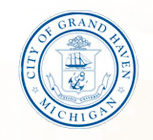 FOR IMMEDIATE RELEASE via Disability Network/Lakeshore
FOR IMMEDIATE RELEASE via Disability Network/Lakeshore
Grand Haven, MI – The City of Grand Haven renewed their commitment to creating a safe and an inclusive community at their regular scheduled City Council meeting on July 18, 2011.
Grand Haven City Council members unanimously approved a Complete Streets Resolution to continue current practices of making the City more accommodating to walkers and bicyclists. The resolution comes after a presentation was made by Disability Network/Lakeshore to the City Council at their July 5th meeting indicating the benefits of such a resolution.
Complete Streets are achieved when local organizations and agencies routinely plan, design, construct, re-construct, operate, and maintain the transportation network to improve travel conditions for bicyclists, pedestrians, and people with disabilities in a manner consistent with, and supportive of, the surrounding community.
City Manager of Grand Haven, Pat McGinnis, drafted a resolution of support for the council to vote on Monday night. McGinnis urged the City Council to adopt the resolution of support stating, “Mobility is important in our community and by passing this resolution we are making a commitment to both ourselves and our citizens that safety and accessibility are key considerations in the planning process.”
Kathryn Gray, Public Policy Specialist for Disability Network/Lakeshore, also indicated a benefit of such a resolution is that, “by passing a Complete Streets resolution, there is the potential for priority when applying for transportation enhancement grants through the Michigan Department of Transportation (MDOT). Communities passing resolutions or ordinances in support of Complete Streets may receive priority when MDOT is making grant considerations.”
Two council members showed concern for passing a resolution stating the City already practices Complete Streets concepts so what is the point for a resolution.
However, on the July 5th meeting Gray stated, “The City of Grand Haven is already making several strides in designing a walkable and livable community as seen in their 2010 City Master Plan but there are always new ways of looking at the planning process and perfecting the process to ensure safe and accessible transportation routes - for both motorized and non-motorized users.”
Manager McGinnis thanked Disability Network/Lakeshore for their technical expertise in presenting to the City Council and in assisting in drafting a resolution of support for the City. Gray is a certified trainer of Complete Streets from the Michigan Department of Community Health’s Complete Streets Institute.
Over 40 Michigan communities have adopted a Complete Street ordinance or resolution. The City of Grand Haven joins the City of Holland, City of Allegan and the City of Grand Rapids in the West Michigan area in passing such resolutions.
For more information:
Kathryn Gray, Public Policy Specialist
Disability Network/Lakeshore
(616) 396-5326
[email protected]
Reported by Paul Lamoureux, Northville Resident
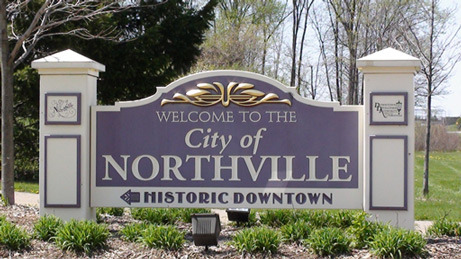
With unanimous accord, the Northville City Council adopted a complete streets resolution at its regular meeting on Monday, June 20. The measure was hailed by its author and initial proponent, City Manger Patrick Sullivan, as a necessary first step toward the establishment of a comprehensive non-motorized master plan designed to link Northville residents with nearby communities of Novi and Plymouth. It turns out Mr. Sullivan has prior, job-related experience with non-motorized infrastructure and has experienced first hand the positive community and economic benefits when a community accommodates all modes of transportation.
Several interesting facts emerged during the discussion of the resolution. Novi, with its own complete streets resolution, was cited as an example of a community benefiting from its long-standing non-motorized plan whose residents have long sought better access to commercial downtown Northville. Residents of both communities also seek a method to bike and walk to nearby Maybury State Park, a presently unsupported route and primary goal for the future. Finally, some expressed support for a better, biker-friendly connection between downtown Northville and Hines Park terminating at the city’s southern border.
A pair of Northville resident League of Michigan Bicyclists (LMB) members first approached the City Manager just a few short months ago to communicate the complete streets message. The city then availed itself of the resources provided by micompletestreets.org and the Michigan Municipal League. Upon passage of the resolution, City Council expressed their interest in further support from LMB in the drafting and implementation of the non-motorized master plan and expressed their gratitude for their leadership thus far in the process.
Marquette, Ludington, Lake Isabella, Acme Twp. and Owosso join the growing list of supportive communities!
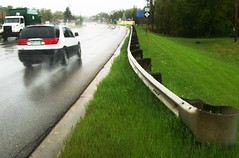
A roadway in need of complete streets in Acme Township. (photo by glhjr)
While we have been a little behind in updating this site the past few weeks, it certainly doesn’t mean there hasn’t been news worth posting about complete streets in Michigan. In fact, we are pleased to report that there have been five complete streets resolutions adopted across the state recently.
On May 9th, both the Cities of Marquette and Ludington adopted complete streets resolutions at their respective City Council meetings. The Mining Journal and the Ludington Daily News both covered the passage of these resolutions.
We also received word this month from Lake Isabella Village Manager Tim Wolff that their Village Council also adopted a complete streets resolution.
As reported on My Wheels are Turning, Acme Township became the first community in Grand Traverse County to endorse Complete Streets at their June 7th Board of Trustees meeting. They join a handful of other townships across the state who have also recently adopted complete streets resolutions. While we are extremely encouraged by the action of these communities, it still remains to be seen what sort of impact these policies will ultimately have since county road commissions actually are the ones who have jurisdiction over roads within townships. Ultimately we hope that we are seeing the beginning of a fruitful dialog between Michigan’s 1200+ townships and the 80+ county road commissions.
It also looks like we might see more complete streets policies coming out of northern Michigan in the near future. According to the Petoskey News Northeast Michigan Council of Governments and Michigan Trails & Greenways Alliance are cooperating to offer complete streets training sessions in Emmet and Alpena Counties at the end of this month.
And lastly, as we reported yesterday, Owosso also recently adopted a complete streets resolution. This brings Michigan to a total of 38 known local resolutions and six ordinances in addition to our statewide law. According to Holly Madill, Complete Streets Project Coordinator for the Michigan Department of Community Health, approximately 2,659,080 people, 27% of Michigan’s population now lives in a community that has endorsed complete streets either through a resolution or ordinance.
View Resolutions:
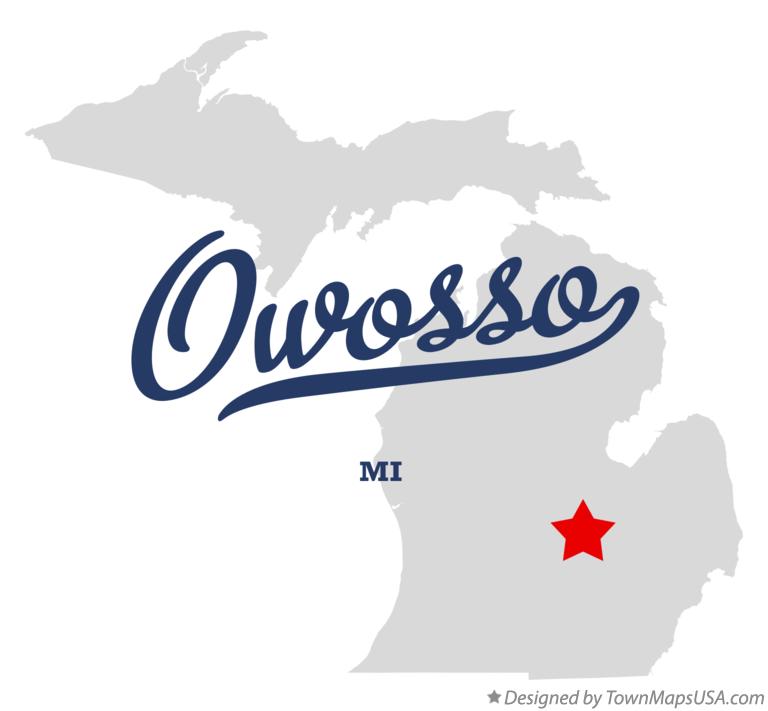 Reposted from Argus-Press.com
Reposted from Argus-Press.com
OWOSSO — The city council this week passed a resolution to support a “complete streets” initiative that promotes safe and efficient movement for vehicles, bicyclists and pedestrians while planning and designing roadway construction.
The resolution states, when feasible, the city will “incorporate the complete street design considerations as a routine part of infrastructure planning and implementation.”
The inclusion of infrastructure like bike lanes and additional easier-to-use crosswalks offers health benefits for the population and makes Owosso a more livable community, the resolution states.
The resolution also requires the Michigan Department of Transportation to consult with city officials when undergoing projects on state highways within the city limits. MDOT is not currently required to seek city input when doing work on state highways such as M-21 and M-52.
Council members expressed concern with MDOT and the lack of communication they had when work was done in the past.
City Manager Don Crawford said the city received notice from MDOT that the organization is requesting engineers to design M-21 west of M-52 and M-52 north of Main Street. He expects MDOT to award the design sometime in the near future.
How much consulting and how much consideration MDOT will give to local input was questioned by some council members.
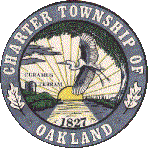 The Oakland Township Board of Trustees voted to pass a resolution supporting the Michigan Complete Streets program [on April 12], which helps “ensure that engineers and planners design roadways to accommodate all users, not just motorists,” according to the coalition’s website [that’s us!].
The Oakland Township Board of Trustees voted to pass a resolution supporting the Michigan Complete Streets program [on April 12], which helps “ensure that engineers and planners design roadways to accommodate all users, not just motorists,” according to the coalition’s website [that’s us!].
“In many cases, this means curb ramps, audible or tactile signals for blind pedestrians, longer crossing times, smooth sidewalks and bike paths that are free of obstacles and transit stops that can be easily boarded,” the website says.
Read the rest of this article by Jen Anesi in the Oakland Township Patch
See additional coverage on M-Bike and Romeo Observer
By Kathryn Gray, Public Policy Specialist - Disability Network/Lakeshore, Lakeshore Friends of Transit
 Complete Streets advocates hit another milestone last night!
Complete Streets advocates hit another milestone last night!
I am excited to announce that the City of Holland unanimously passed a Complete Streets Resolution at their regular City Council session last night. The City of Holland is the second in the Disability Network/Lakeshore’s service area (Allegan + Ottawa counties) to have passed a Complete Streets resolution – the City of Allegan passed their resolution in December of last year.
The City of Holland is one of the local units of government that Disability Network/Lakeshore has been working closely with since the May 2010 Complete Streets Panel Event and the November 2010 Livable Communities Event to develop a Complete Streets Policy. Phil Meyer, Director of Community & Neighborhood Services, Jodi Syens, Director of Transportation Services, and Brian White, City Engineer were all very committed to the process including holding several study sessions in designing the resolution.
City of Holland was eager to pass the policy based on the fact that they already implement many of the concepts of Complete Streets within their planning processes. This policy only supports their current processes and ensures that all users are being considered when designing or reconstructing the City’s transportation network.
“The City has been aggressive about examining complete streets issues in all of its street construction, reconstruction, sidewalk improvement, and bike facility efforts as a matter of normal course of doing business. These issues, often involving participation of neighborhood residents, businesses, and other property owners, are well-considered in the context of the specific conditions of a particular project, as well as in the context of the larger City-wide (and beyond) network” said Phil Meyer, Director of Community & Neighborhood Services. “The most recent example of a positive process and end result was the reconstruction of 40th Street. Also, this past summer, the City participated with the Lakeshore Disability Network in their three-part program looking at livability issues in the community, with a heavy focus on “complete streets” issues. The Network is a very strong advocate for the adoption of complete streets policies across the region, as are a number of other organizations.”
The passage of this resolution moves the count up to 39 for Michigan approved complete streets resolutions or ordinances (that we are aware of). The City of Holland is the third for West Michigan, after the City of Allegan (12/10) and the City of Grand Rapids (3/11).
Congratulations to the City of Holland and West Michigan complete streets supporters!
Marquette Township, Ispeming and Oakland Township adopt complete streets resolutions.
Holland, East Lansing and Lansing Township close.
First meeting scheduled for Complete Streets Advisory Council.
Complete streets continues to gain momentum around the state. Last week, two Upper Peninsula communities, Marquette Township and the City of Ishpeming both passed Complete Streets resolutions. “Marquette Charter Township has been a leader in providing for the health, safety, welfare, and ease of mobility for those preferring non-motorized modes of transit. In 2003 our Planning Commission required that all new or substantially reconstructed roads must provide an adjacent non-motorized alternative. So, moving forward with the Complete Streets process was a natural for us,” said Randy Girard, Township Manager for the Charter Township of Marquette.
We have learned that the City of Marquette is also working on a policy and should be bringing it before City Council within a month or two. When passed this would make three policies withing Marquette County. Our hats off to our partners at the Marquette County Health Department for all their great leadership in moving these policies forward.
According to the Oakland Township Patch, the Oakland County Board of Trustees voted last night to pass a resolution “supporting Michigan Complete Streets program.” We have not seen the actual language of the resolution yet, but are honored to have the official endorsement of the Board of Trustees for our work to advance complete streets across the state. We look forward to working with the Township in helping to advance their efforts to safely accommodate all roadway users.
Oakland Township becomes the second Oakland County township, after Milford Township, to adopt a Complete Streets resolution. As with Milford Township, Oakland Township does not have jurisdiction over roads. It is the Road Commission for Oakland County who owns, builds, and maintains them within the county. The Complete Streets state law passed last August, however, does state that a “county road agency shall consult with the municipality and agree on how to address the respective complete streets policies.” Other townships that have adopted complete streets include Marquette Township, Union Township and Atlas Township. We will be keeping a close eye on these communities to see how the road commissions and townships work together to implement complete streets.
Oakland Township wasn’t the only municipality busy last night advancing complete streets. We learned via our Facebook Page, that the City of Holland Planning Commission passed a complete streets draft resolution which will be sent to the City Council for approval within the next few months. “The Michigan Association of Railroad Passengers (MARP) feels that a complete streets policy will assist in the City of Holland becoming the friendliest city in America,” said John D. Langdon, Governmental / Public Affairs Coordinator for MARP.
Additionally, a steering committee composed of community leaders and local residents in Lansing Township are guiding a process of developing a complete streets ordinance and non-motorized transportation plan. They are hosting townhall meetings tonight and tomorrow evenings (April 13 & 14) to discuss the proposed ordinance. They have also launched a public survey for community members to provide input.
Just down the road, the City of East Lansing is planning to bring their draft ordinance up for a vote within the next couple of months. Hearing news of the progress in Lansing Township and East Lansing to adopt complete streets, Meridian Township Trustee Veenstra expressed interest in following suit. Also in Mid-Michigan, the City of Mason is showing signs of support by featuring complete streets on the front cover of their latest newsletter.
In statewide news, we are pleased to report that the first meeting of the Complete Streets Advisory Council has been scheduled for April 27, 2011, from 1:30 to 3:30 p.m. in the VanWagoner Transportation Building, 425 W. Ottawa Street, Lansing. The meeting will be held in the Lakeshore Learning Center Conference Room, located near the first floor lobby.
 Union Township officials confirmed their commitment to building a vital community by passing a Complete Streets Resolution at their regular meeting on Wednesday, March 23.
Union Township officials confirmed their commitment to building a vital community by passing a Complete Streets Resolution at their regular meeting on Wednesday, March 23.
The resolution affirms the township is moving towards making the township more walkeable and bikeable and will incorporate Complete Streets concepts in its transportation planning and improvements.
Union Township became the 34th Michigan Community (see comment) to pass a Complete Streets ordinance or resolution in coordination with state legislation that was passed in 2010.
The township has been working with the City of Mount Pleasant, Isabella County, Central Michigan University, the Saginaw Chippewa Tribe. Local schools and other institutions and community organizations on a micropolitan area non-motorized transportation plan along with the Greenway Collaborative of Ann Arbor.
Union Township Complete Streets Resolution
▲ Here is a copy of Union Township’s Complete Streets Resolution















